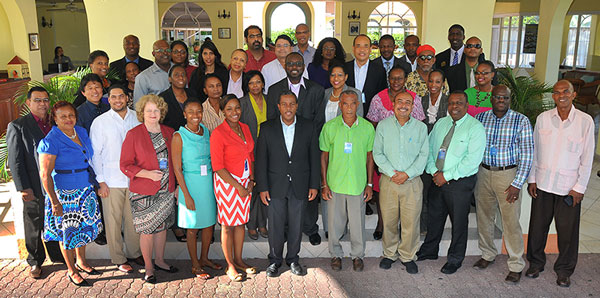 A Regional Bipartite Meeting attended by representatives from senior trade union and employer organizations from fifteen Caribbean countries was held 3-5 November 2015 in Grenada, under a Project funded by the European Union and executed by the International Labour Organization (ILO).
A Regional Bipartite Meeting attended by representatives from senior trade union and employer organizations from fifteen Caribbean countries was held 3-5 November 2015 in Grenada, under a Project funded by the European Union and executed by the International Labour Organization (ILO).
In a joint statement, David Massiah, President of the Caribbean Congress of Labour (CCL) and Wayne Chen, President of the Caribbean Employers’ Confederation (CEC) announced the agreement to establish formal bipartite forums in each of the fifteen Caribbean States. These forums will deepen cooperation between trade unions and employers’ organizations to better coordinate research and advocacy on matters of mutual importance.
Welcoming the initiative, Wayne Chen opined that “these bipartite forums will mark a new era in the cooperation between workers’ and employers’ organizations that will no doubt improve the region’s business climate.”
One of the key conclusions of the meeting in Grenada was a recognition of the need for both employer and worker representatives to be more closely involved in the curriculum and strategy development of national vocational and technical training institutions. Youth unemployment is the single most pressing issue to be addressed in the region and ensuring that coherence exists between job market requirements and the skills of job seekers is a top priority.
The participants determined from a practical perspective, whether the fundamental labour principles prohibiting child labour, forced labour and discrimination along with the right to freedom of association and to bargain collectively were in place in each country. These four areas form the platform for the implementation of the ILO’s Decent Work Agenda.
Representatives also assessed the national monitoring mechanisms for the implementation of the Economic Partnership Agreement (EPA) between the European Union and CARIFORUM countries. It was agreed that a more consolidated focus was needed in each of the countries to ensure that appropriate measures be put in place to enhance the benefits to be derived from the EPA.
David Massiah said “both labour and employers demonstrated commitment and support of the work done over the three days. This augurs well for the future success of the programme which will send positive messages to our Governments.”
Claudia Coenjaerts, Director, ILO Decent Work Team and Office for the Caribbean, noted that the mechanisms for social dialogue in the Caribbean need to be strengthened. She stressed that during times of financial crisis, "social dialogue is our key tool in the bag when addressing economic downturn...Tripartism and social dialogue are essential building blocks of a peaceful and thriving economic environment." She stressed that the EU-funded Project is an opportunity for workers’ and employers’ organizations to play their role in the implementation, governance and monitoring of the effects of the EPA Social Aspects Chapter. “This Project is your opportunity to build a CEC and CCL strong enough to have a recognized status in COHSOD and COTED, strong enough to influence social and economic CARICOM policies.”
EU-funded project entitled Challenges to CARIFORUM Labour Private Sector and Employers to fulfil their EPA Obligations: Caribbean Employers’ Confederation (CEC) and the Caribbean Congress of Labor (CCL) Component of the Support to Facilitate Participation of CARIFORUM Civil Society in Regional Development and Integration Process.